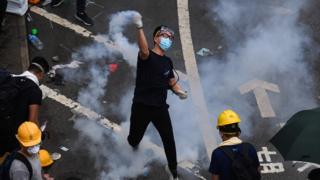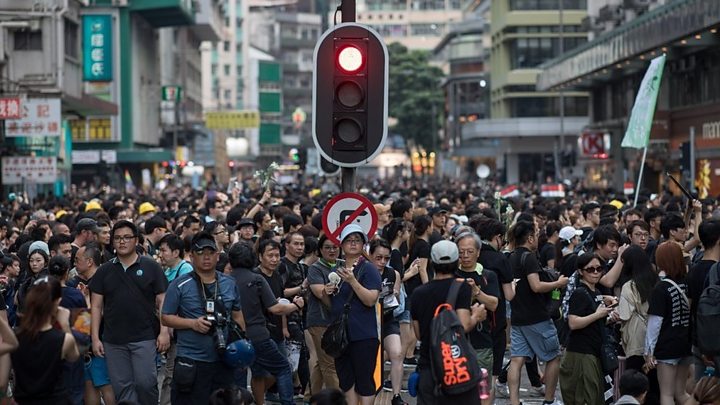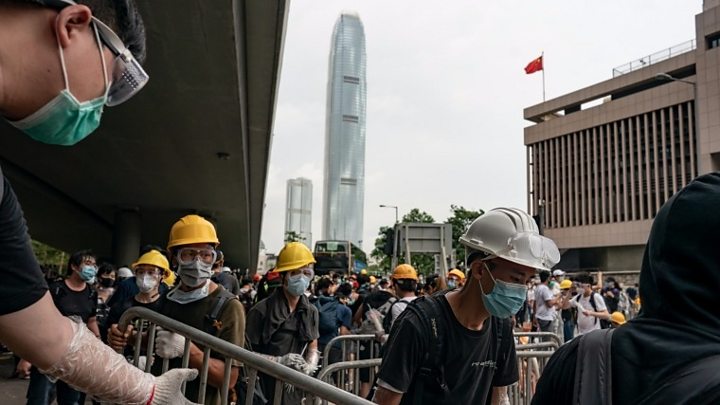Young, radical and ready for tear gas
In just one week Hong Kong has witnessed two of its largest ever protests, as well its most violent protest in decades. At the forefront of these demonstrations are young people, many barely out of their teens. How did they get radicalised – and how did they manage to force the government’s hand?
“We screamed at people to run.”
“My parents kicked me out after the protests.”
“It was the first time I got tear-gassed – tears were coming uncontrollably out of my eyes.”
“I’m afraid to give my real name.”
These are not words anybody would have expected to come out of the mouths of Hong Kongers – and certainly not ones aged between 17 and 21.
Until recently the stereotype of a “typical” Hong Kong teen would have been one more interested in studying or making money than political activism or creative thinking.
But last week saw the streets around Hong Kong’s legislature taken over by young people wearing masks, setting up barricades, and throwing gas canisters back at police.
Many of them were even too young to have taken part in the last Hong Kong protest to hold the world’s media rapt – the 2014 Umbrella protests, when tens of thousands of people slept in the streets for weeks, demanding democratic elections.
Fear of the Chinese future
The 2014 protests – which were also known as the Occupy Central protests – ended without any concessions from the government.
This time round it has been different.
The latest demonstrations, against a controversial bill that would allow people in Hong Kong to be extradited to mainland China has, strikingly, forced the government to apologise, and pause its plans – effectively shelving them say many analysts.
So what is different this time round? And what role has this generation of young activists risking tear gas, rubber bullets, and even arrest (let alone their future employment prospects) played?
Hong Kong’s youth have experienced something of a political awakening in the last two decades – the proportion of registered voters aged 18-35 rose from 58% in 2000, to 70% in 2016.
And it’s not surprising, when you consider that Hong Kong’s political future is an increasingly pressing issue.
The territory currently enjoys special rights and freedoms due to a handover agreement between the British, who previously colonised Hong Kong, and the Chinese government.
But in 2047, the agreement enshrining Hong Kong’s special status expires – and nobody really knows what will happen then.
For today’s youth, 2047 feels strikingly close – and their protest is driven by this uncertainty, as well as a feeling that the Chinese government is closing in anyway.
No longer certain the system will protect them, they are modifying their protest techniques and learning the art of sophisticated dissent.
Every single protester I interviewed who had taken part in Wednesday’s unauthorised protests asked me to protect their identities – fearing arrest.
“We kept face masks on at all times during the protest, and afterwards we tried to delete our records on our iPhones and Google Maps,” says Dan, an 18-year-old student who helped protesters build a barricade with fences.
Some have taken to buying paper train tickets, rather than using their prepaid travel cards – on the basis this could make it harder for the authorities to trace their whereabouts.
Meanwhile, many have become cautious about what they say on public social media – and are only willing to communicate on secure apps with self-destruct functions, such as Telegram.
“During the Occupy protests, most of us didn’t think about protecting ourselves, we used Facebook, Instagram and Whatsapp to spread messages. But this year, we see that freedom of speech is getting worse in Hong Kong,” says Jackie, a 20-year-old student leader.
A broken relationship
Several people – including students and teachers from Hong Kong’s most prestigious institutions – have been arrested, some of them from hospital where they were having injuries treated.
A 22-year-old who was identified as the administrator of a Telegram group sharing information about the protests was also arrested on “public nuisance” charges.
Jackie fears that, amid all this, student leaders involved in Wednesday’s protests may be targeted because of their higher profile.
“I’ve been sleeping at my student union office because I’m afraid of being detained if I go home,” she says.
This is typical of a more broken relationship with law and order officials, and compared to earlier protests, these activists have diminished faith in police.
On Thursday, rumours circulated that police intended to search student bedrooms at a dormitory at the University of Hong Kong , where two residents had been arrested the previous day.
The University of Hong Kong’s Simon KY Lee Hall confirmed that two of its students were arrested in Wednesday’s clashes. Management said they are being bailed by police.
They did not answer whether the student residence would be subject to a police search later. pic.twitter.com/GiP2EAzRjm
End of Twitter post by @HongKongFP
Amid the panic, students quickly called local legislators and lawyers, who surrounded the building – although ultimately, no police entered the hall.
Dan says police actions during the Occupy protests – where a number of police were jailed for beating up a protester – had also damaged his trust.
“Before that, I believed police were supposed to be law abiding and help citizens… now, I realise that some police may let their personal emotions get the better of them.”
These students and young workers seem more willing to defy public assembly laws, and risk arrest for a cause, than previous generations of protesters.
They argue they have more to fight for, as they have come of age in a more precarious political environment.
Tom, 20, helped manage supplies during Wednesday’s protest, and says he’s an activist because of “the era I’m growing up in”.
His generation grew up experiencing witnessing political rows, such as plans in 2012 to make children take Chinese “patriotism” classes, that critics said would “brainwash” students and gloss over the Chinese government’s human rights abuses.
“I’ve seen government policies and moves to suppress the freedoms we have grown up with – and it makes me feel strongly that I don’t want Hong Kong to lose its core rule of law and freedoms.”
Other young people have complained about government policies, including the recent introduction of a law punishing those who disrespect the Chinese national anthem, the disqualification of pro-democracy and pro-independence legislators, and the jailing of a pro-independence activist.
The Occupy protests have left a clear – if complicated – legacy for today’s protesters.
Many of Wednesday’s protesters were too young to take part in 2014’s protests – but see them as both an inspiration and a lesson learned.
Ben, 20, says his parents did not let him join the Occupy protests.
But now, as a university student, he takes a leading role organising protests and legal support for students at risk of arrest.
He describes the 2014 protests as a “failure” – as the protesters were split over their goals, including what sort of “universal suffrage” would be acceptable.
But this time, there is a crucial difference – because protesters are not demanding more democracy, but fighting to keep what rights Hong Kong currently has.
There is a greater incentive to stay united, because protesters are “fighting to make sure we don’t lose our existing freedoms”, he says.
The Occupy protests spurred more young people to get involved in student politics and gave them the confidence to claim the streets as their own.
Jackie, who helped run a first-aid station last Wednesday, describes them as her “political awakening”.
“Previously I was not that involved in politics – but the movement made me realise how important it is.”
They also taught today’s youth just how to prepare for standoffs with the police.
On one university campus, students stockpiled dozens of bags and cardboard boxes of medical supplies, such as inhalers for people affected by tear gas, and saline water to wash away pepper spray.
Students said many items had also been donated by members of the public.
This meant that they were a much more effective crowd on the Wednesday when things turned violent.
What do their parents think of all this? It varies.
Ingrid, 21, joined Wednesday’s protests after she finished work, helping to deliver first aid materials to the frontline.
She says her parents, who supported the police, kicked her out of the house after she went home – although they let her return a few days later.
Meanwhile, Jackie “didn’t dare” tell her parents and grandparents about her role organising the protests, but when they saw her on the news they were supportive and asked her to stay safe.
Of course, it would also be a mistake to treat these protests as purely a youth movement.
Leader Carrie Lam also came under pressure from several quarters, including from businesses groups, her church, and her alma mater.
St Francis Canossian College was among the hundreds of groups to issue a petition against the bill – a significant move in Hong Kong where the top schools are considered highly prestigious, and alumni networks are influential and a source of pride.
One alumni who signed, 22-year-old Aubrey Tao, said Ms Lam often quoted the school motto, and she hoped to show her that “as a Franciscan, you shouldn’t rule in this way”.
But it was the unauthorised, youth-led demonstrators on Wednesday – and their ability to camp out in numbers, organise and force the police hand – which many see as a critical factor in forcing the government to stop and pause.
The wider population could easily have condemned the students – as they have done with previous protests that turned violent.
But it seems this time, they felt the police went too far.
During clashes, riot police responded with rubber bullets, beanbag shots and 150 canisters of tear gas – more than was used during the entire 79 days of the Umbrella protests.
Police defended their approach, saying it was necessary to respond to the “riot”, and that protesters had attacked officers with bricks and iron poles.
Some protesters who spoke to the BBC also confirmed they saw water bottles, or sticks, being thrown at police by others.
Nonetheless, the sight of young protesters being pepper sprayed and facing large amounts of tear gas still left many angry at the authorities – and at Ms Lam, who had defended the police.
In one viral video, a middle aged woman was seen screaming at police officers, reminding them “you are going to be dads in the future”.
Following the clashes, church groups went to join the protesters on the streets, singing “Hallelujah” to the police for hours.
And thousands of women gathered for a “mother’s rally”, holding placards with slogans such as “don’t shoot our kids”.
As the public mood intensified, former government officials began to speak out, urging Ms Lam not to rush through the legislation at such a heated time.
Even some pro-Beijing lawmakers and officials started calling for a delay, admitting they had underestimated the public reaction to the bill – a significant response in a legislature where only about half the seats are directly elected by the public, and pro-Beijing groups hold the balance of power.
It’s not clear where Hong Kong goes next – Ms Lam announced on Saturday that the bill would be paused, but even more people took to the streets on Sunday, demanding it be withdrawn entirely.
Some at Sunday’s rally were protesting for the first time, saying they had come out to take a stand against police violence, and show their support for the young protesters.
What is clear is that the events have changed perceptions of protests in Hong Kong.
Tom says the anti-extradition movement “broke through the past 30 years of protest traditions”.
“We never would have thought before that singing hymns in front of police for hours, mothers gathering for a protest, or reporters wearing their riot gear in a silent protest, would have worked.”
Ingrid, who says she was tear gassed for the first time in her life on Wednesday, described the experience as agonising.
“It stung, I couldn’t see – and I was in a dress and boots. I didn’t know that water reacts with the itchiness – so when I took a shower I actually felt like I was in hell, it was scalding. I never want to hear that popping sound [of a gas canister] again.”
And yet, she said she would keep protesting.
“My concern for how this city I call home will turn out far outweighs my fears for my personal safety.”
Names have been changed.
Source: Read Full Article





